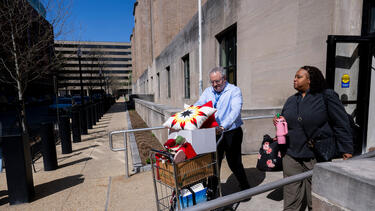Faculty Viewpoints
The Science and Politics of Vaccines Collide
Dr. Howard Forman reflects on heartening new evidence for the effectiveness of the HPV vaccine—and troubling signs of vaccine skepticism from the Trump administration.

How the Business Community Turned Back Tariffs—for Now
Objections from business leaders played a key role in pushing the Trump Administration to reverse course on recently announced “reciprocal” tariffs, according to Yale SOM leadership expert Jeffrey Sonnenfeld and co-author Stephen Henriques. It’s a win for business, they write, but the business community remains concerned about uncertainty around economic policy.

The Trump Tariffs Are Paralyzing Business Investment
Yale SOM’s Jeffrey Sonnenfeld and co-author Steven Tian write that the administration’s unpredictable approach is bringing new corporate initiatives to a standstill and pushing the economy toward recession.

Understanding the Healthcare Impact of Mass Firings in Washington
The scale of cuts to the federal healthcare workforce is now coming into focus. Dr. Howard Forman explains the potential life-and-death consequences of cuts to key programs and the departure of longtime leaders.

Video: Can the Tools of Finance Help Combat Climate Change?
Yale SOM’s Stefano Giglio, an expert on climate finance, explains what green investing can and can’t do to help speed the transition to a post-carbon economy.

CEOs Don’t Want to Return to Russia, Because They Know It’s Bad Business
Amid warming relations with Washington, Vladimir Putin is floating new opportunities for Western companies in Russia. But Yale SOM’s Jeffrey Sonnenfeld and co-author Steven Tian write that business leaders are reluctant to reengage in a dangerous setting and a faltering economy.

Elon Musk Is Kicking Down the Barn, Not Building a Better Government
Yale SOM leadership expert Jeffrey Sonnenfeld writes that rather than zeroing in on waste and bureaucracy, the Department of Government Efficiency is driving out thousands of critical workers.

Are Trump’s Tariffs Repairing Market Failures or Eroding Global Trust?
Yale SOM’s Jeffrey Sonnenfeld and co-authors Stephen Henriques and Steven Tian write that while there are legitimate reasons for some tariffs, the president’s arbitrary approach is worrying allies and unsettling markets.

Does the Rasputin Curse Live Again?
Leadership expert Jeffrey Sonnenfeld and co-author Steven Tian look across history for examples of pitfalls that could lie ahead for Elon Musk and Donald Trump.

The Consequences of Slashing Medicaid Spending
Congressional Republicans are looking to make deep budget cuts, and Medicaid spending is a target. Yale SOM’s Dr. Howard Forman says that large-scale reductions in the program would hit the poorest states and the most vulnerable Americans especially hard.
